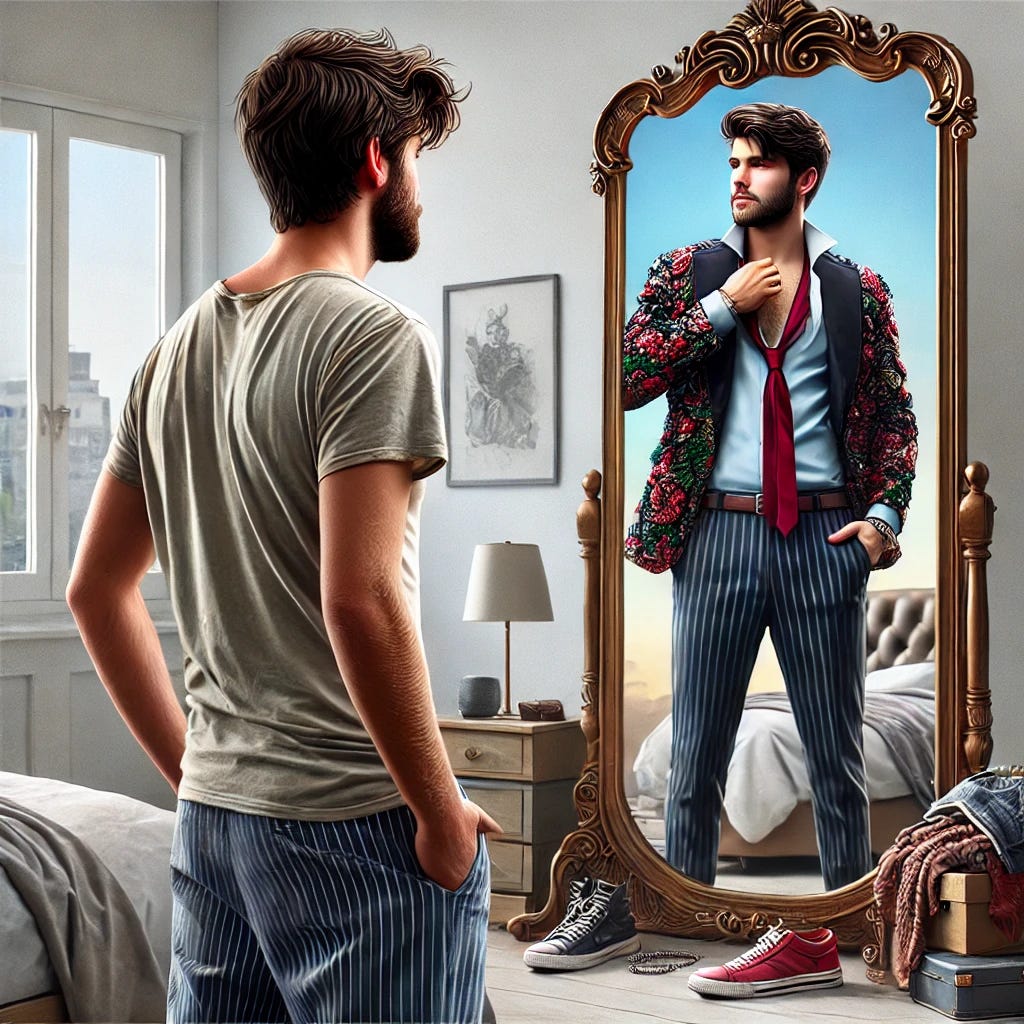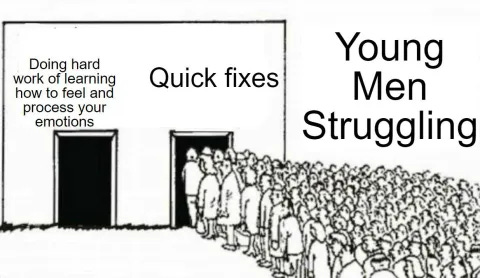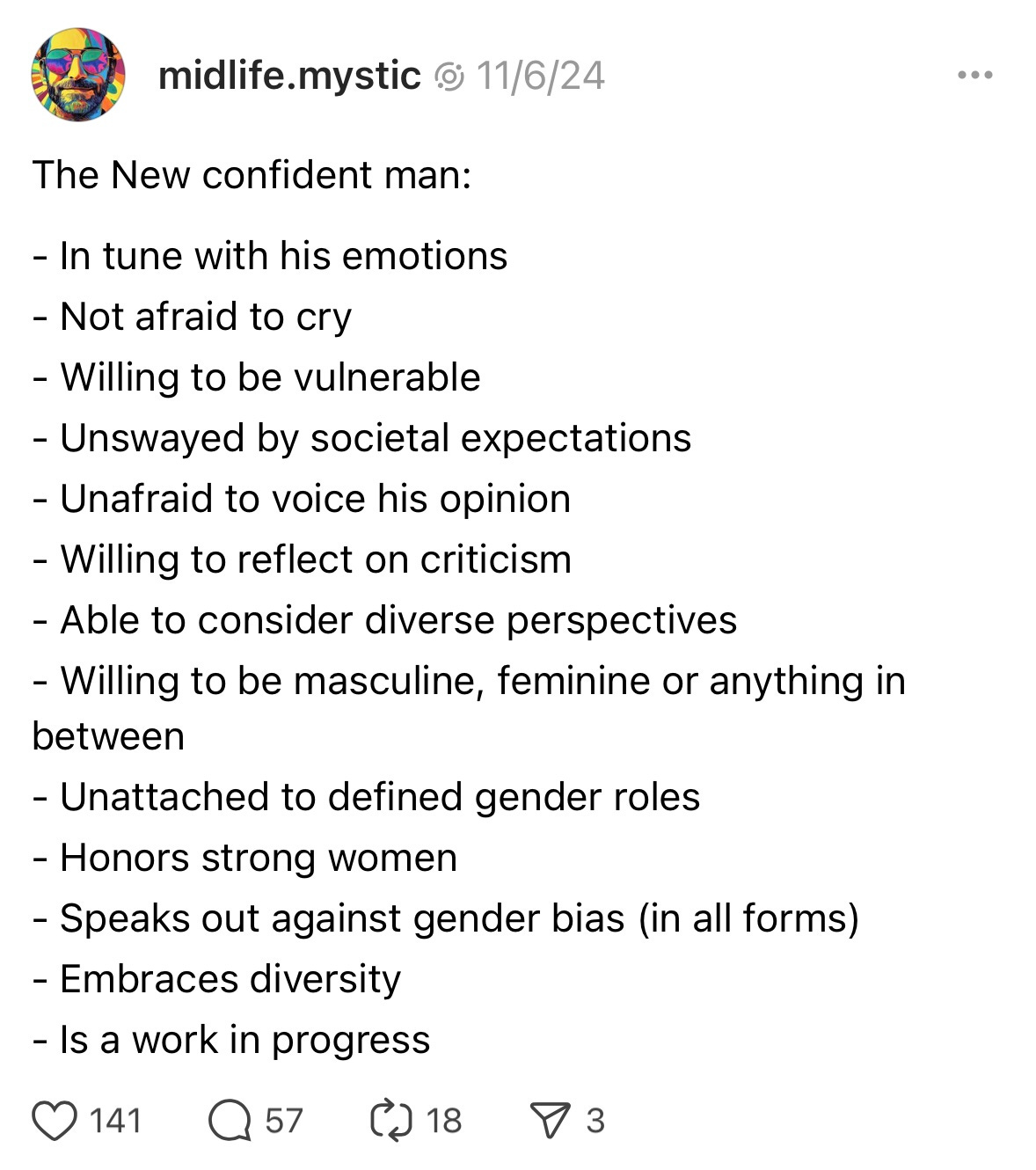One story from Trump’s election win was his successful effort to woo the so-called manosphere. He appeared on a slew of shows (Theo Von, The Nelk Boys, Logan Paul) with huge audiences of young men—a demographic he ended up winning by a big margin.
What does Trump’s win say about the concerns of young men in America?
Experts say we’re in the midst of a crisis of manhood. Young men are trying to understand their place in a society that is rapidly evolving. As a group they are struggling more academically, with more mental health challenges and rising rates of suicide.
Fewer young men are graduating from college. There are now 2.4 million more female than male undergraduates on US campuses. This creates dating problems for women, who face a shortage of eligible male partners who can match their education and professional status.
More men are dropping out of the workforce. They don’t have enough friends. They’re struggling with loneliness and social isolation, video game addiction, substance abuse.
Young men are drawn to voices that validate their insecurities, from social media influencers to controversial figures like Andrew Tate and Jordan Peterson. But are these the right role models?
There’s a big opportunity to change the way we model healthy masculinity for boys and young men. To rethink how we help them navigate the complexities of being a man in society today.
Different Types of Masculinity
I gathered a few friends recently to discuss masculinity and how society can better serve its young men. I wanted to hear from both men and women about their experiences with masculinity (both good and bad) and evolving gender roles.
I grew up with male role models who embodied different types of masculinity. My late father was a sensitive male who told me it was ok to cry and I should be in touch with my feelings. I’ve had other male role models who were more alpha males, embodying more traditional masculine, dominant personality traits.
Why are men today so confused? We talked about how the ground is shifting beneath our feet. In the 1950s, gender roles were more clear-cut. The man was the breadwinner, the wife stayed home and raised the family.
Today, the lines have blurred. Women entered the workforce. More fathers are taking paternal leave. Domestic responsibilities have shifted. There are more stay-at-home dads.
My friends talked about how men are getting mixed signals about how to behave in a dating context. There may be different expectations about the idea of treating women as equals in the workplace vs. in dating and relationships.
Men wonder: Should I hold the door open? Should I pay for the date? What about the Uber to and from the date—should I cover that, too?
Men wonder if it’s ok to cry in front of a woman they’re dating. How a partner would feel about their relationship if they left the workforce. Or if their partner made more money than them.
The Lure of the Manosphere
As an uncle to three teenage boys, I wondered how younger generations think about these topics. Young men are more fluent in the language of micro-aggressions and gender-neutral pronouns, but they seem to be struggling with the same issues.
Which role models should they follow? Who’s modeling healthy masculinity for young boys today?
Manosphere influencers like Jordan Peterson, Andrew Tate and Joe Rogan have built huge followings by tapping into the fears and insecurities of this generation of young men.
Instead of criticizing young men for admiring people like Peterson, Tate and Rogan, maybe we should take a moment to understand why they look up to them. What needs aren’t being met that lead them to these voices?
I posed this question on social media. Here are a few notable responses:
Men today struggle with the expectation to be providers and protectors, a challenge amplified by the economy and the difficulty to maintain physical and mental strength.
Figures like Tate, Peterson and Rogan tap into male anxiety, offering guidance and validation. Some manosphere influencers leverage these men’s desire for affirmation to lure them into extremist ideologies.
Young men are suffering because society teaches them that the only emotion they’re allowed to feel or show is anger.
Young men admire Rogan and Musk because they have wealth and access to celebrities. They look like alphas that get women.
An investigation in 2022 found that TikTok bombards young men with misogynistic content after watching male-oriented videos, including clips of dogs, men talking about mental health, and comedy.
That’s the problem with the manosphere. It seems like if you’re a young, ambitious man who wants to make money, be fit and meet women, you’re just one click away from misogyny and hate.
Where are the young male voices teaching young men not to be assholes?
Do we need a “goodmanosphere” for Gen Z and Gen Alpha?
Modeling Healthy Masculinity
My friend Dr. Josie Lehrer created the Men’s Story Project to give men a forum to share personal stories that explore and challenge masculinity. She also recommends ManEnough, which is building a movement around healthy manhood and greater equity for all. Their podcasts and videos explore what it means to be a man today and promote examples of healthy masculinity.
GQ has written about the anti-toxic masculinity movement, highlighting influencers who preach a more evolved take on manhood.
Dan Guinness, Managing Director at Beyond Equality (“Helping men to find their roles in an equitable future”), shares a list of positive masculinity influencers to follow: Dr. Alex George, Jordan Stephens, Munya Chawawa.
Unfortunately, it’s been hard for positive masculinity to break through. Social media algorithms reward content that is provocative and extreme.
A few writers have attempted to define a new kind of healthy masculinity. The Crowther Centre in Australia defines positive masculinity as:
“The expression of attitudes and behaviors (character strengths and virtues which any gender might have) that have been embodied and enacted by males for the common good, both individually and for the community.”
We need more celebrities and influencers who model positive masculinity. Who show how a man can be strong, but also willing to be vulnerable. How a man can make his partner feel safe and protected, but also be sensitive to her emotional needs.
From social media to parents and teachers, it starts with positive role models. Ones who show boys what it means to be a kind and compassionate man of integrity. That’s the goodmanosphere I’d like to see.
I’d love to hear your thoughts. How can we model healthy masculinity for today’s young men?
Thank you for reading this week’s edition of Vitamin Z.
Until next time,
By Daniel Zahler
Hi there and thanks for reading. I created Vitamin Z to share my research on health and wellness, longevity and healthy aging, and ways to optimize cognitive, physical and emotional health. I serve as an advisor to Noom, a leading digital health company, and work with the world’s top healthcare and life sciences companies to develop innovative new solutions to improve health globally. I was trained as a research scientist at Harvard, and I serve as a GLG council member, where I advise global business leaders on healthcare and technology innovation.
Enjoyed your reading experience?








